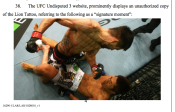 |
A tattoo artist sued THQ, Inc., the makers of an Ultimate Fighting Championship (UFC) themed video game, for copyright infringement. The artist tattooed a lion on fighter Carlos Condit's torso, and claims that it was his original creation. (Complaint at 12.) The artist alleges that he created the original design, and owns a registration for the copyright to the design. (Compl. at 16.) He claims that by using the work in a video game, depicting Carlos Condit, THQ infringed upon his copyright in the work.
A press release issued by the firm representing the artist, Christopher Escobedo, states:
"People often believe that they own the images that are tattooed on them by tattoo artists," explains Speth [Escobedo's attorney]. "In reality, the owner of the tattoo artwork is the creator of the work, unless there is a written assignment of the copyright in the tattoo art." Escobedo and Condit never had a written agreement. Thus, claims Escobedo in the lawsuit, he remains the owner of the copyright over the image he drew.
Nothing in this statement is false, but that doesn't mean that this gets you to the correct answer. Here is the correct answer:
1. Ownership of the copyright: If the tattoo artist designed the tattoo and did not sign a "work for hire" agreement, then the copyright in the tattoo is, presumptively, his intellectual property. No question about it. Therefore, I can't take a copy of that tattoo and make posters of it. Nor can Condit. I can't re-license it to other people. On ownership of the copyright, I think the artist wins, hands down.
But, that doesn't mean that he wins the case.
2. Fair Use: I see very little room to argue that THQ's use is not fair use. THQ has the right to use Condit's likeness. That likeness happens to have been augmented with someone else's copyrighted work. The copyright owner can no sooner prohibit this use than he can prohibit me from using it demonstratively as I have in this piece (doubly so, since I clipped it from his complaint). THQ can't accurately depict Condit without the tattoo. THQ can not be prohibited from depicting Condit accurately, just because the artist wants more money.
That said, there might be some theoretical claims, but not against THQ. Condit himself might (I stress MIGHT) have some liability. This is a highly theoretical argument - but I presume that Condit got paid for the right to use his likeness in the video game. Let's say that the agreement has a clause that states that Condit has the legal ability to transfer or license all relevant rights. There *might* be an argument that Condit did not have the right to assign the rights to the ink, and thus the artist gets a portion of Condit's profits. Again, theory here, and not likely. But, if I had to save the case, I'd argue that.
3. Right of Publicity: The tattoo has now become part of Condit's persona. So, could copyright actually limit his right of publicity? An interesting egghead argument to be merged with #2, but essentially, if the artist prevailed against Condit, it would mean that anyone who gets a tattoo without a work for hire agreement has mortgaged a certain portion of their publicity rights to the tattoo artist. I am not seeing that as a winning theory.
Bottom line: Fair use, artist loses. Creative arguments could revive the case under some exotic uses of state law claims, which would (at best) be against Condit, and for a small fraction of what Condit himself earned, but even then, I can't see them carrying the day.
The case is Christopher Escobedo v. THQ Inc., 2:12-cv- 02470-JAT, U.S. District Court, District of Arizona (Phoenix).
H/T: TechDirt
Marc Randazza is a Massachusetts, California, Nevada, Arizona, and Florida attorney and 'First Amendment bad ass.' He also writes for his own law blog, The Legal Satyricon.




